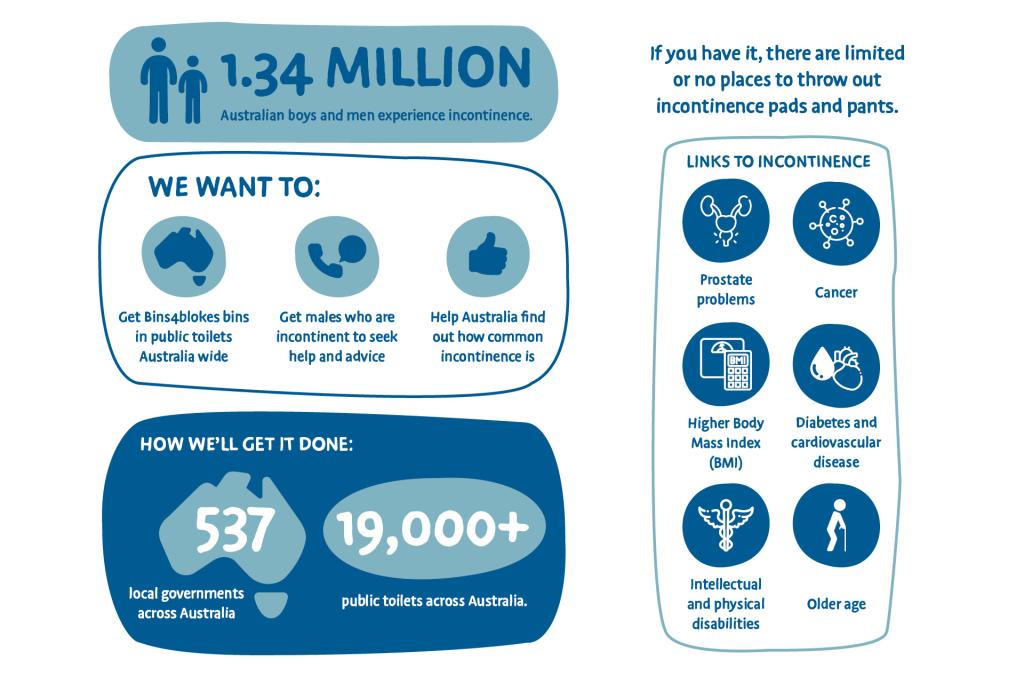Bins 4 Blokes
The first anniversary of the launch of the Bins4Blokes campaign is this month, coinciding with World Continence Week, June 21-26.
hen a patient opened up about the challenges of living with incontinence, men’s health physiotherapist Dr Jo Milios knew something had to be done. Having had the opportunity to work with thousands of men undergoing treatment for prostate cancer, and dealing with incontinence issues following surgery or radiation therapies, Jo was very aware of the lack of hygiene facilities for men in public toilets. When Lina Scaffidi described her husband’s difficulties in disposing of continence pads, Jo knew that Mr Scaffidi was
not alone.
Approximately 1.34 million boys and men in Australia live with incontinence – that’s 1 in 9 males. Like Mr Scaffidi, many experience incontinence following surgery for prostate cancer. In addition, continence pads for the loss of bladder or bowel function are a fact of life for many men at some point during their life, with patients with a range of conditions such as diabetes, Parkinson’s disease, learning disabilities, obesity and gastrointestinal issues confronting the same problem.
“Despite it being lawful that all female toilet facilities have every cubicle allotted a hygiene bin, no such regulation exists for male toilets, with most no longer even having a wastepaper bin.”
With nowhere to place pads, men have struggled to have their personal care needs addressed. Despite it being lawful that all female toilet facilities have every cubicle allotted a hygiene bin, no such regulation exists for male toilets, with most no longer even having a wastepaper bin.
Teaming up, Jo and Lina launched a campaign to raise awareness of the need for sanitary hygiene bins in men’s toilets. Together they collected thousands of signatories for a petition to the Federal Government and contacted providers of public toilets. An article about the campaign on ABC’s online news soon followed in 2018, recording 250,000 views. By the end of the month, the Continence Foundation of Australia (CFA) had joined forces, bringing with them a number of leading men’s health peak bodies. A working party was appointed and the ‘Bins4Blokes’ campaign was officially named and put to task.

As a member of the Rotary Club of Perth City East, WA, Jo then rallied the support of her local membership via a five-minute presentation at a fortnightly breakfast meeting. This resulted in pledges from a broad sector of the Rotary community, including shopping centres, hospitality groups, Men’s Sheds, healthcare facilities, and most significantly the WACA, home to cricket in Western Australia.
Over the next two years, despite COVID lockdowns, the Bins4Blokes campaign, led by CFA, continued to evolve markedly. This month marks one year since the Bins4Blokes campaign was officially launched on June 21, 2021, at the WACA ground – which became the first stadium in Australia to install men’s hygiene bins.
“Approximately 1.34 million boys and men in Australia live with incontinence – that’s 1 in 9 males.”
At the launch, Ken ‘Noddy’ McAullay (former AFL player, WA cricketer and prostate cancer survivor) reflected from the oval’s edge: “Fifty years ago, I was padding up for Western Australia and today I am proudly padding up for men’s health.”
This month also sees World Continence Week, from June 21-26, which aims to highlight the impact of urinary incontinence and encourages those living with it to seek help.
“Raising awareness is key, as few men will ask for help directly,” Jo explains.
Businesses are often not aware of the problem and are only too happy to install a bin for men when this issue is brought to their attention. It is a very inexpensive service with bins costing as little as $120 per year, with service providers available on the Bins4Blokes website (bins4blokes.org.au). However, simply asking your own provider is a good place to start.
How can Rotary help?
You can support this campaign by contacting your local council and MPs, your local shopping centre management, cinemas, art centres, museums, community centres, local newspapers and community Facebook pages. You can also pledge your support, download resources, and nominate sites where you would like to see a bin installed, by visiting the Bins4Blokes website. And if you operate public or staff toilets and you’re wondering what you need to do to install some hygiene bins for men, please visit the ‘Bin Providers’ section of the website to get started.
Related news
Dubbo West Community Carols by Candlelight
Celebrate the festive season at Dubbo’s Carols by Candlelight, promising fun, music and the big man himself.
Sanitation solutions in Sumba
By PDG John KevanRotary Club of Mandurah Districts, WA In East Sumba, where the financial capacity to support water and health requirements for villages in remote areas is severely limited, Fair Future Foundation has been successfully providing materials and training to enable villagers to build their water and sanitation facilities for more than 15 years. […]
Queanbeyan delivers U-Turn the Wheel pilot program
Throughout May, the Rotary Club of Queanbeyan, NSW, held the 2024 pilot program of U-Turn the Wheel (UTTW) at three local high schools in Queanbeyan – The Anglican School at Googong, Karabar High School, and Queanbeyan High School. Overall, approximately 125 students took part in the one-day program. Feedback from students and staff was positive, […]
Join our newsletter for the latest updates
"*" indicates required fields


